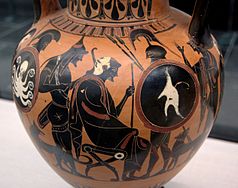Food or Pet? [1]
I just wanted to share information. This is about the OCTOPUS. I've seen shows on Discovery about thier intelligence. I admire thier ability to change colors and adapt to thier environment. That's cool as a fan.
I believe we have all, at one time or another surely blended into an environment, be it, work, home, church (surely when I visited the church, I had to adapt or get "excercised" heheheee (puttin that darn oil on my head and waiten for the demons to fly out, YUK) why? I asked too many questions lol), where ever you adapted because you had to, for survival purposes. Thank God and Goddess/SPIRIT/YIN and YANG/Shiva and Shakti, ect. that does not have to transpire anymore.
Love Nageeta
Relationship to humans
Centre: Moche Octopus (200 AD), Larco Museum Collection [7], Lima, Peru
On the right is an ancient Greek [8] black-figure [9] amphora [10], 530–520 BC; on the left is a hoplite [11] with an octopus image on his shield. Staatliche Antikensammlungen, Munich, Germany
Ancient peoples of the Mediterranean [12] were aware of the octopus, as evidenced by certain artworks and designs of prehistory. For example, a stone carving found in the archaeological recovery from Bronze Age [13] Minoan [14] Crete [15] at Knossos [16] has a depiction of a fisherman carrying an octopus.[46] [17]
Octopuses were often depicted in the art of the Moche [18] people of ancient Peru [19], who worshipped the sea and its animals.[47] [20]
In mythology
The Hawaiian [21] creation myth [22] relates that the present cosmos is only the last of a series, having arisen in stages from the wreck of the previous universe. In this account, the octopus is the lone survivor of the previous, alien universe.[48] [23]
In literature
The octopus has a significant role in Victor Hugo [24]'s book Travailleurs de la mer (Toilers of the Sea [25]).[49] [26]
As a metaphor
Due to having numerous arms that emanate from a common center, the octopus is often used as a metaphor for a group or organization which is perceived as being powerful, manipulative or bent on domination. Use of this terminology is invariably negative and employed by the opponents of the groups or institutions so described.[50] [27]
As food
![]() Wikibooks Cookbook [28] has a recipe/module on
Wikibooks Cookbook [28] has a recipe/module on
Humans eat octopus in many cultures. The arms and sometimes other body parts are prepared in various ways, often varying by species.
Octopus is a common ingredient in Japanese cuisine [32], including sushi [33], takoyaki [34], and akashiyaki [35].
In Korea, some small species are sometimes eaten alive [36] as a novelty food. A live octopus is usually sliced up, and it is eaten while still squirming.
 [37]
[37]
Octopuses are "tickled" out of their holes in the Hawaiian Islands with three-pronged polespears [38]
Octopus is eaten regularly in Hawaii [21], since many popular dishes are Asian in origin. Locally known by their Hawaiian or Japanese names (he'e and tako, respectively), octopus is also a popular fish bait.
Octopus is a common food in Mediterranean cuisine [41] and Portuguese cuisine [42]. In Galicia [43], polbo á feira [44] (market fair style octopus) is a local delicacy. Restaurants which specialize or serve this dish are known as pulperías. On the Tunisian [45] island of Djerba [46], local people catch octopuses by taking advantage of the animals' habit of hiding in safe places during the night. In the evening, they put grey ceramic pots on the sea bed. The morning of the following day they check them for octopuses sheltered there. A common scene in the Greek islands is octopuses hanging in the sunlight from a rope, just like laundry from a clothesline. They are often caught by spear fishing close to the shore. The fisherman brings his prey to land and tenderizes the flesh by pounding the carcass against a stone surface. Thus treated, they are hung out to dry, and later will be served grilled, either hot or chilled in a salad. They are considered a superb meze [47], especially alongside ouzo [48].[citation needed [49]]
According to the USDA [50] Nutrient Database (2007), cooked octopus contains about 139 kilocalories (Calories) per three-ounce portion, and is a source of vitamin B3 [51], B12 [52], potassium [53], phosphorus [54], and selenium [55].[51] [56]
Care must be taken to boil the octopus properly, to rid it of slime, smell, and residual ink.[citation needed [49]]
As pets
Though octopuses can be difficult to keep in captivity, some people keep them as pets. They often escape even from supposedly secure tanks, due to their problem-solving skills, mobility and lack of rigid structure.[citation needed [49]]
The variation in size and lifespan among octopus species makes it difficult to know how long a new specimen can naturally be expected to live. That is, a small octopus may be just born or may be an adult, depending on its species. By selecting a well-known species, such as the California two-spot octopus [57], one can choose a small octopus (around the size of a tennis ball [58]) and be confident it is young with a full life ahead of it.[citation needed [49]]
Large octopuses have also been known to catch and kill some species of sharks [59].[52] [60]





